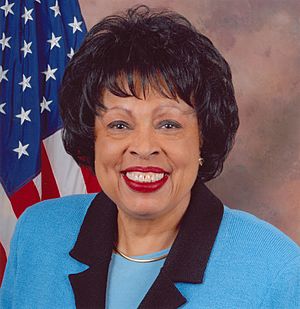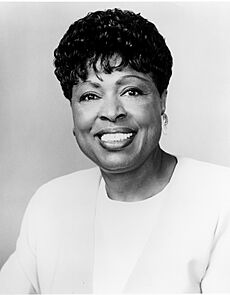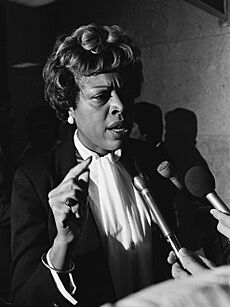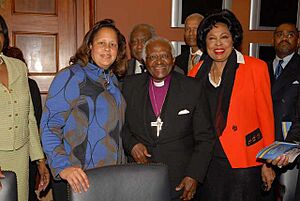Diane Watson facts for kids
Quick facts for kids
Diane Watson
|
|
|---|---|
 |
|
| Member of the U.S. House of Representatives from California |
|
| In office June 7, 2001 – January 3, 2011 |
|
| Preceded by | Julian Dixon |
| Succeeded by | Karen Bass |
| Constituency | 32nd district (2001–2003) 33rd district (2003–2011) |
| United States Ambassador to Micronesia | |
| In office 1999–2000 |
|
| Preceded by | March Fong Eu |
| Succeeded by | Larry Miles Dinger |
| Member of the California Senate | |
| In office December 4, 1978 – November 30, 1998 |
|
| Preceded by | Nate Holden |
| Succeeded by | Kevin Murray |
| Constituency | 30th district (1978–1982) 28th district (1982–1994) 26th district (1994–1998) |
| Personal details | |
| Born | November 12, 1933 Los Angeles, California, U.S. |
| Political party | Democratic |
| Residence | South Central, Los Angeles |
| Alma mater | University of California, Los Angeles (BA) California State University, Los Angeles (MS) Claremont Graduate University (PhD) |
| Occupation | College administrator Health Psychologist Specialist |
| Committees | House Foreign Affairs Committee House Oversight and Government Reform Committee |
| Website | http://www.house.gov/watson/ |
Diane Edith Watson (born November 12, 1933) is a former American politician. She served as a US Representative for California from 2001 to 2011. She is a member of the Democratic Party. Her district was in Los Angeles County, California.
Before becoming a US Representative, Watson was a US Ambassador to Micronesia. She also served in the California Senate for many years. She has a background as a psychologist and educator.
Early Life and Education
Diane Watson was born in Los Angeles, California. She grew up in a Catholic family. Her parents were William Allen Louis Watson and Dorothy Elizabeth O’Neal Watson. DNA analysis shows some of her ancestors came from the Central African Republic.
She went to Dorsey High School and Los Angeles City College. She earned her first degree, a Bachelor of Arts in Education, from the University of California, Los Angeles in 1956. While there, she joined the Alpha Kappa Alpha sorority.
Later, she earned a Master of Science degree in School Psychology from California State University, Los Angeles in 1967. She also received a PhD in Educational Administration from Claremont Graduate University in 1987. She also studied at Harvard Kennedy School at Harvard University.
Early Career
Watson worked as an elementary school teacher. She was also a school psychologist in the Los Angeles public schools. She taught at California State University, Long Beach and California State University, Los Angeles. She also worked for the California Department of Education. Before entering politics, she served on the Los Angeles Unified School District Board of Education.
Political Career
California State Senate

Diane Watson was elected to the California State Senate in 1978. She served there for 20 years, until 1998. She was the first African American woman to serve in the California State Senate.
During her time as a State Senator, she led the Health and Human Services Committee. She was known for supporting health care for people who were poor and for children. Because of term limits, she could not run for re-election in 1998. Kevin Murray took her place.
In 1988, the US government thought about adding a "bi-racial" or "multiracial" category to official forms. Watson and other African American leaders did not support this idea. They worried it might change how people identified as African American.
In 1992, Watson ran for the Los Angeles County Board of Supervisors. She lost a close election to Yvonne Burke.
US Ambassador to Micronesia
In 1999, President Bill Clinton appointed Watson as the United States Ambassador to Micronesia. She served in this role for two years. She left this position to run for Congress.
US House of Representatives
In 2001, a special election was held to fill a vacant seat in Congress. The previous Representative, Julian C. Dixon, had passed away. Watson won the Democratic primary election with 33 percent of the vote. She then won the special election in June 2001 with 75 percent of the vote.
She was re-elected four times. She retired from Congress at the end of the 111th Congress in 2011.
Key Issues and Stances
In Congress, Watson became a strong voice for fairness and equality. She supported ideas like:
- Helping descendants of American slaves.
- Improving the education system.
- Providing financial help for families without health care.
- Making big changes to the nation’s criminal justice system.
She also spoke out against unfair treatment of Arab Americans after the September 11, 2001, attacks.
2004 Presidential Election
Watson was one of 31 House Democrats who voted against counting the 20 electoral votes from Ohio in the 2004 United States presidential election. President George Bush won Ohio. If Ohio's votes were not counted, the election would have been decided by the US House of Representatives.
Opposition to President George W. Bush's Policies
Congresswoman Watson often disagreed with President George W. Bush's policies. She supported:
- Taking US troops out of Iraq.
- Stopping large companies from owning too many media outlets.
- Expanding welfare programs.
She opposed President Bush's plan to privatize Social Security. She also thought the Bush tax cuts were too expensive.
Cherokee Nation Citizenship
Watson was concerned about the citizenship rights of Cherokee Freedmen in the Cherokee Nation. These were descendants of formerly enslaved people who had been part of the Cherokee Nation. In 2007, the Cherokee Nation voted to change its rules. This change would limit citizenship to only those with a Native American ancestor on the Dawes Roll.
Watson pointed out that a treaty from 1866 had granted citizenship to freedmen without such limits. In June 2007, she introduced a bill. This bill would cut US ties with the tribe and remove its gaming privileges. This would happen unless the Cherokee Nation gave citizenship back to the descendants of Cherokee freedmen. This action caused some tribal leaders to accuse her of interfering with Native American tribal independence.
Other Issues
In 2006, the National Journal called Watson the most liberal member of Congress. She strongly supported more funding and research for the HIV/AIDS pandemic. She also argued for humanitarian help for African nations affected by the disease.
Committee Assignments
Watson served on important committees in the House of Representatives:
- Committee on Foreign Affairs
- Subcommittee on Africa and Global Health
- Subcommittee on Asia, the Pacific, and the Global Environment
- Subcommittee on Terrorism, Nonproliferation, and Trade
- Committee on Oversight and Government Reform
- Subcommittee on Domestic Policy
- Subcommittee on Government Management, Organization, and Procurement (Chairwoman)
- Subcommittee on Information Policy, Census, and National Archives
Caucuses
Watson was also part of several groups in Congress called caucuses:
- Chair of the Congressional Entertainment Industries Caucus
- Co-chair of the Congressional Korea Caucus
- Co-chair of the U.S.-UK Caucus
- Congressional Black Caucus
Political Campaigns
In the 2008 Democratic primary, most voters in Watson's district supported Illinois Senator Barack Obama. However, as a superdelegate, Watson continued to support New York Senator Hillary Clinton.
Watson won her primary election in California on June 3, 2008. She then defeated Republican David Crowley in the November 4, 2008, election.
See also
- List of African-American United States representatives
- Women in the United States House of Representatives
 | Valerie Thomas |
 | Frederick McKinley Jones |
 | George Edward Alcorn Jr. |
 | Thomas Mensah |



